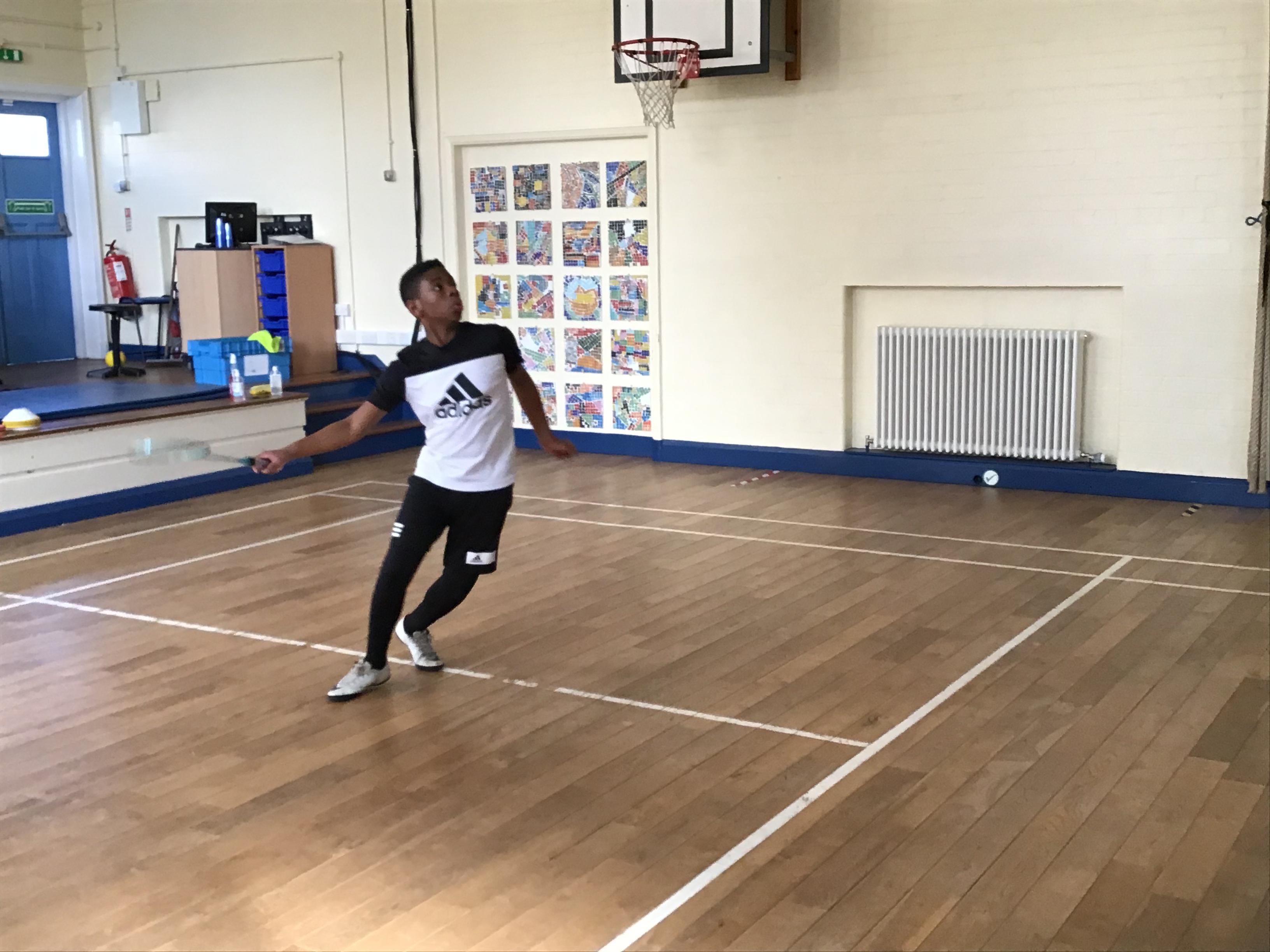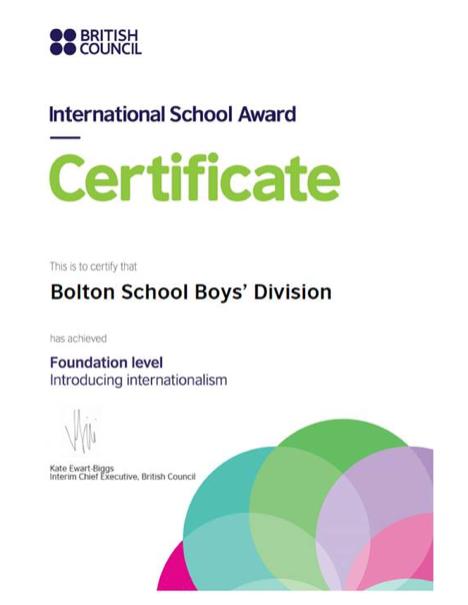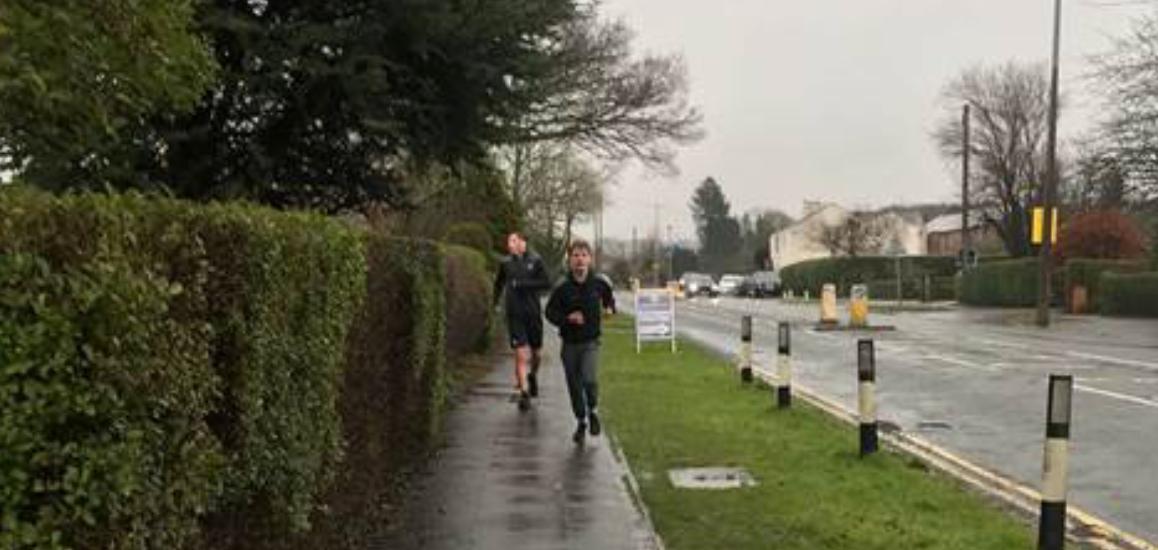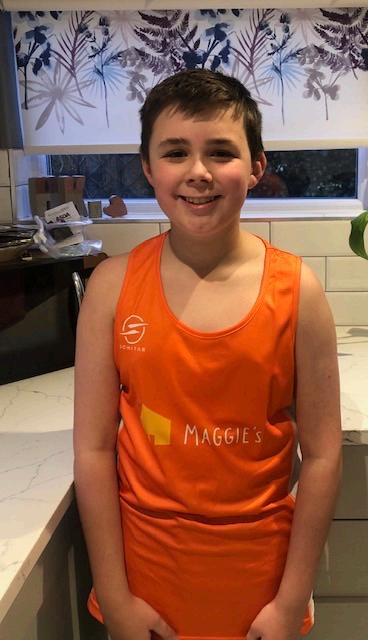The Cockerel













Those Year 7 and 8 boys who do not have the option of remote learning owing to their parents being critical workers have been hosted by the Junior Boys’ Division at Park Road for the first half of Spring Term – also known as Lockdown 3.0. They were designated three classrooms in order to provide spatial distancing to assist in our COVID-19 protective efforts, and so became three distinct bubbles recognised by the colour of their bibs.
The cover supervisors have tried – despite some technology issues – to encourage all boys in School to attend every lesson on their regular timetables just as they would have had to do when remote learning from home. Probably the main difference has been the need to be diligent over break and lunch in order to fit around the smooth running of the Park Road timetable. Mrs. Gregory comes round every morning while we are in registration or assembly to check everyone who should be in School is present. The numbers are then used to ensure the required lunch provision is sent to catering and, most importantly, that catering is aware of any boys with food allergies. Those pupils who didn’t attend their form meetings on the first or second morning as we started at Park Road, thinking it wasn’t compulsory, soon realised the need to attend and to develop a structure for each day in School.
While pupils at home were asked to keep fit and healthy by their PE teachers during their PE and Swimming lessons, at Park Road the mats were taken out and all the Joe Wicks workouts (and others) were completed. The boys watched all the sports videos and some extra ones set by Mr. Sutcliffe to help to teach the rules and techniques for the sports that had been played during sports lessons. The boys then spent extra time completing their respective projects on the Arts Award (Year 7) and Accelerated Reading Programme (Year 8).
During sport lessons, they have played chess (when it has been too wet to go out), table tennis, badminton, dodgeball, basketball, rounders, football and hockey golf (seeing how far the hollow balls could be driven up the Park Road playing field from a golf driving position with hockey sticks). Most individuals were challenged with presenting to their bubbles on a sport they had never played before, so we received presentations and watched sports videos on many new sports including bossaball, water rugby, underwater rugby, chess boxing and kabbadi, to name but a few. Time in the playground saw cricket for the orange bubble and football for the green bubble, whilst football and the wildlife area became the domain of the blue bubble at break and during lunchtimes. Dodgeball, table tennis and badminton became lunchtime extra-curricular activities, with the Year 8 bubble competing in the “Lockdown Special” badminton knockout, cup and plate competitions. The draw for the badminton tournament for the two Year 7 bubbles is being made in readiness for our return after the half term holiday, so they are all hoping to practise as often as possible in preparation for this prestigious Lockdown 3.0 event.




On National Poetry Day in October of last year, poet Andrew McMillan, in conjunction with Bolton School Boys’ Division, launched a poetry competition for children aged 5-18 years across the Bolton borough. The Revisioning Poetry competition ri ff ed on the National Poetry Day theme of ‘Vision’.

The results are now in! The award-winning poet said: “What a joy it was to spend time with all this creativity! There were so many exciting poems here, some using form in new ways, some rhyming brilliantly, some doing entirely new things. Many of these poems seemed focused on loss, on what might happen if the sun or our school or our own house disappeared; poems like this have, at their core, a deep concern for our planet, which is great to see and which hopefully we can harness to do all we can to help the environment as we get older. So many of the poems too, were simply having fun, which is one of the most important things for writing. It can be something we forget as we get older, and something I was really pleased to be reminded of! It was incredibly hard to pick out poems and rank them. If I were allowed, I would have given everyone a prize!”
The Secondary School challenge for 11-18 year olds asked entrants to write a poem from an unusual point of view. McMillan suggested that the poems might look at things slightly askew, from the point of view of an inanimate object, or from several different views at once. He encouraged students to surprise themselves with their approaches – to move away from the idea
that a poem is just a poet looking at someone or something and describing it.

Christian Stapleton, a Year 12 pupil at Bolton School Boys’ Division, was selected as the overall winner. McMillan praised his poem, ‘Trench of Youth’, describing it as: “a poem that takes a unique, original form. It is really three poems in one, each one shedding new light on the others – a threedimensional experience.” Christian reflected, “I really enjoyed inventing and playing with the structure of my poem, envisioning the best way to convey my ideas by both weaving
themes together and contrasting narrative threads. I was interested in conveying the clockwork nature that can be forced on relationships by the habit and expectation. Now, the idea of readers drawing their own conclusions about my work is just as exciting as doing the work in the first place - it's a huge privilege to be published and to have an audience!”
Reflecting on the benefits of the competition, Disha from Bolton School Girls' Division said: "The reason I wrote this poem is that I wanted to express my feelings in these strange times. I enjoyed writing from an object’s point of view because I imagined the object I did, was actually a person with feelings and emotions."
Rebecca, from the same school, reflected on her inspiration: "I have always loved animals and plants, and knowing that they are losing their homes is dreadful. So I picked up my pen, pushed my piece of paper towards me, and wrote. I imagined as if I were a tree, standing there for decades, as an experienced witness of the beauty of life and its modern and brutal threats."
The Primary School challenge for children aged 5-10 years asked pupils to think about something they encounter every day. The poet suggested they might think about something small such a spoon in the kitchen cutlery drawer or conversely, something big like a particular tree at the end of the street or the building that they attend school in. The twist was to imagine that one day, their focus vanishes and to write about the disappearance. Lucy, aged 10, from St. Catherine’s CE Primary School in Horwich was the
Primary Category winner. She was very excited to have her work recognised and said, "My dad introduced me to Brian Cox and I have been interested in space ever since. I wanted to bring this feeling into the poem." McMillan described Lucy’s work as a poem in which “the world is transformed by this unique departure; the idea that the waves die, the great image of the ‘winking stars’, and the ending are all very powerful. Maisie, also aged 10 and from St. Catherine's, wrote a poem that received a commendation from Andrew. Maisie said, "I wrote about the disappearance of my brain because it’s a dramatic moment in many ways. I wanted to introduce a cliff-hanger to make my poem spooky! At the end of the poem I used repetition to have a questioning effect on the reader. I wanted my poem to be like a guessing game, in which the reader had to guess what happened to the character. I really enjoyed the rhyming and having poem fun with friends!"
and a Northern Writers’ award (2014). In 2019, it was voted as one of the top 25 poetry books of the past 25 years by the Booksellers Association.

His second collection, playtime, was published by Jonathan Cape in 2018; it was a Poetry Book Society Recommendation for Autumn 2018, a Poetry Book of the Month in both The Observer and The Telegraph, a Poetry Book of the Year in The Sunday Times and won the inaugural Polari Prize.
Andrew's latest collection, pandemonium, will be released in May 2021. He is a senior lecturer at the Manchester Writing School at MMU and lives in Manchester.
The winning poets, commended writers and their teachers have been invited to tour the new Manchester Poetry Library later in 2021. The pupils also receive book tokens; winners receive a collection of poetry books for their school library. The young writers’ work is published in a Re-visioning Poetry anthology.
Andrew McMillan’s debut collection physical was the first ever poetry collection to win The Guardian First Book Award. The collection also won the Fenton Aldeburgh First Collection Prize, a Somerset Maugham Award (2016), an Eric Gregory Award (2016)

Bolton School Boys’ Division has received the British Council International School Award at Foundation level. This award celebrates and supports the inclusion of an international ethos, both within the curriculum and embedded in school culture, and recognises schools that show a commitment to international awareness and understanding.

Mr. Carl Robson, the Boys’ Division Head of Modern Foreign Languages (MFL), said: ‘Bolton School Boys’ Division has a long and proud tradition in Modern Foreign Languages, offering French, German, Russian, Spanish and Mandarin. We have a large department of eleven full time and two part-time colleagues teaching their subject specialisms to A Level and beyond. We have many students go on to study languages at university and are celebrating our latest Oxbridge success with Jack Danson being offered a place to read French and German at Oxford.

‘Over the years we have achieved national recognition in the Spelling Bee Competition, in the North Schools’ MFL Debating Competition and in essay writing competitions.
‘We have been a hub for the National SCITT (School-Centred Initial Teacher Training) programme o ff ering teaching opportunities to trainee MFL teachers in partnership with local schools.
Schools participating in the International School Award are encouraged to complete collaborative work with international partner schools, and are offered guidance to sustain and further develop international education within the school and curriculum. The programme and introduction of internationalism in school offers pupils increased awareness of other countries, cultures and languages as well as the confidence and skills to live and work in a global society.
‘We offer trips to Paris, to the Rheinland, to Northern Spain and to Russia as part of our Trips and Visits programme. The school has partnerships with schools in France, Germany and Russia. We employ language assistants through the British Council annually and give native speakers in French, German and Spanish speaking countries the opportunity to spend a year in the UK in high quality school accommodation. In recent years, we have welcomed Spanish assistants from Colombia and Murcia, French assistants from Normandy and the Vendée region and a German assistant from Austria. These opportunities really benefit our students too.
Boys’ Division Deputy Head (Academic) Mr. Nic Ford Tweeted about the achievement: ‘Very pleased @BoltonSchool Boys’ Division have been awarded the International School Award from @BritishCouncil for promoting the international dimension across school and highlighting the benefits of learning in a global context.’
‘There has never been a more important time to promote the joys and benefits of learning living languages post-Brexit. We are delighted that the British Council wish to recognise our place in supporting language teaching in the UK.’


James Bowie and Ollie Cook, two Year 10 pupils, have so far raised £1,346 for Mind, the mental health charity. The boys completed a 26km (16 miles) run from Bolton to Deepdale, Preston North End Football Club’s ground, in horrendous weather conditions. They were delighted to well and truly smash their target, which had been £350. Although they trained by building up the distance of their runs, neither of them had ever completed such a distance before. Having fuelled up on carbs the previous evening, they found the
first leg simple enough, but then the second and third sections became more challenging because of the weather conditions –heavy rain and even snow at some points!
James planned the running route to ensure there were pathways most of the way and that there were two break points for refuelling – one after 6.4 miles and the other after 11.5 miles. Most of the route was along the A675.

Ollie and James arranged the fundraiser themselves and they hope the money raised will go towards a helpline for teenagers struggling with mental health issues. There is still time to donate to the cause here.
Two proud mums Andrea Cook and Jane Bowie said: “We are really impressed with the boys – they came up with the idea themselves and selected the Mind charity because it felt like the right thing to do with so many cases of mental health developing as a result of the pandemic. People are still giving money to the cause and the boys are really grateful to everyone who has donated so far!”

Schoolboy Harry Iddon is clocking up the miles this month in a bid to raise funds for the cancer centre Maggie’s in Manchester.
Harry, a Year 7 student at Bolton School Boys’ Division, has set himself the task of walking and running 50 miles before the end of February.

The sporty 11-year-old has so far raised £700 of his £1,000 target, thanks to generous donations from friends, family and his parents’ colleagues.
“It’s a really good way to get him fit and raise money for a fantastic charity that’s been hit hard in the pandemic,” said Harry’s mum Kate Iddon, who has used Maggie’s facilities in the past when receiving treatment for breast cancer.
Harry, who is six miles into his challenge, is covering the distance via daily walks with Kate and weekend runs with his dad.
Maggie’s offers free support to cancer patients and their families through its centres across the UK.

To sponsor Harry, email shanna.mcgoldrick@nqnw.co.uk
Article by Shanna McGoldrick and reprinted with kind permission from ‘The Bolton News’ 27.01.21

Iam delighted to report that, despite the significant challenges presented by repeated lockdowns, individual music-making has not only survived, but, for many, has continued to thrive at School.


Music has the power to enrich our lives on a daily basis, whether soothing us while we reflect, or energising and inspiring us to seize the day and feel positive. For our musicians, developing their skills and being able to perform at home has really helped them to deal with the pressures faced during the pandemic restrictions, boosting their wellbeing.
‘Zoom fatigue’ is undoubtedly real, but the situation faced in Lockdown would be much worse were we not able to communicate using Zoom’s features. Zoom’s software has been enhanced to allow the audio settings to be used more effectively by musicians, so that many of the nuances of a musical performance can be heard, in addition to its previously existing clear ‘conference’ speech transmissions. This facility has meant

that instrumental and vocal lessons have continued successfully for the majority of our musicians, and I am grateful to all of our Visiting Music Teachers for their ongoing efforts in making individual music lessons both productive and rewarding.
Exam boards were forced to cancel face-to-face exams and created digital alternatives to allow candidates to submit performance videos for assessment. These exams carry the same weight as in-person exams, including the UCAS points awarded at Grades 6-8. A number of pupils have been successful in ABRSM, Rockschool and Trinity digital exams from Grades 2-8 on classical guitar, electric guitar, drum kit, piano, singing and violin. Congratulations to all candidates on their achievements to date. Further exams will be taken in the Spring and Summer terms.
Ensemble rehearsal or performance is unfortunately not possible ‘live’ on Zoom due to internet latency issues, which mean that performers cannot synchronise. It is, however, possible to splice individual video or audio recordings together to create a ‘full’ ensemble performance. Admittedly, this is a very time-consuming process, but well worth the effort, as was the case for the Senior Concert Band’s performance of ‘Call Me Maybe‘ created by Miss Sherry last summer. I will be directly involved in preparing the musicians of the National Children’s Orchestras Online project, which will culminate in July in a group performance of a specially commissioned piece, created from up to 600 individually submitted videos from throughout the UK.
Despite not being able to present live musical events onsite, dozens of our pupils have been featured in virtual concerts, which have certainly been well received. As these concerts have been made available online through webinars and YouTube links, the performances have been enjoyed by more widespread audiences than our traditional onsite performances allow. Click here to listen to last week’s Year 8 Virtual Concert.
Our Young Musician of the Year Heats proceeded via video entries, as did the Semi-Final, adjudicated by North West based conductor, Ellie Slorach. When local restrictions are known, the format of the Final will be announced and it would be wonderful if this could be a small-scale socially-distanced event held in the Great Hall - time will tell. The Finalists are as follows:
Antoine Jodeau (7d) Tom Fox (12e) Brass
James Wilson (8d) Harry Paterson (13f) Guitar
Ashton Kay (9e) Jamie Death (11e) Percussion
William Martin (9e) William Miles (12f) Organ/Piano
Matthew Yeung (7d) Harry Adams (10c) Strings
Nathan Pierson (8e) Jude Ashcroft (13f) Vocal
Martin Ma (7g) Thomas Higham (13b) Woodwind
Charlie Middleton (13f) Vocal
As the Headmaster has said previously, ‘we have had to be creative about being creative’, and I am grateful to all pupils and colleagues who have continued to generate enjoyable musical experiences. I am sure that our music-making will continue to flourish, and I relish the prospect of live performances at school in due course, which can be appreciated directly by an enthusiastic audience present in the venue.

The Boys’ Division has continued to be a hive of activity this half term, despite the national Lockdown. Boys have continued to pursue extra-curricular activities such as Chess, Model United Nations and Senior Literary and Debating Society. Lunchtime rehearsals for the School Production have continued virtually, as has Quiz Club for Year 10, the Advanced German Grammar Club for Year 11 and the Astronomy Club for Middle School boys.
Both the Shrewsbury Model UN and Manchester Debating Competitions went ahead this weekend, as did the Chemistry Race, in which the ‘Kroto Chemists’ Thomas Higham, Matthew Morrison, Arsh Patankar, Kei Soi Wong and Thomas Yates reached a commendable position.
Freddie Higham, Anuj Mishra and Thomas Martin in Year 12 took part in the remote online UK Linguistics Olympiad last week, in which pupils are challenged to solve a range of complex linguistic data problems using a set of new and unfamiliar languages. They are awaiting the issue of results.
The boys recently enjoyed an Offline Day, which was a welcome chance for them to engage in a range of activities away from their iPad screens.
Mrs. Brandon, Deputy Head Pastoral, gave a recent moving Assembly for Holocaust Memorial Day, which can be viewed here.
The Parents’ Association ‘Teenage Journey’ presentations have also continued. Most recently, Gareth Cheeseman from ACET UK presented on Relationships and Sex Education, which can be viewed here.

At the end of each week, a short 2 minute film has been posted on the School’s social media channels, which shows a range of remote and in-School learning that has taken place over the previous five days across the campus. The videos can be viewed here.



Keshana Fonseka, a Year 10 pupil, has joined the Lancashire Cricket Academy. He follows in the footsteps of Year 13 student Praharsh Parikh and in those of Sami Waheed of Year 12, who recently joined Lancashire's Emerging Players’ Programme. Keshana initially attended MCC Foundation coaching sessions at Bolton School before enrolling as a pupil. Talking about what he has been working on in training, he said: “The
first thing that I have been focusing on is my strength and condition. In the Academy, the fitness levels step up massively. It is very important for playing long hours of cricket and still performing at your best levels, whilst avoiding injuries.
‘Another area I have been working on is batting a long innings. I have been batting against the Academy bowlers with a mat on the surface, to make it more match realistic. I have also been working on playing spin, especially left arm off spin. We have been trying to hit through mid-on and mid-off, on a sharp spinning surface, which is particularly useful in rotating the strike when there is a long-off and long-on. Furthermore, we have been looking to develop more scoring areas against spin, with the sweep becoming a really good option.
‘With fielding we have been looking at our technique. We have been working on picking the ball up and getting to the release point smoother and faster, which can make the difference in a run out. In catching, we have focused on our posture and keeping the head still and ensuring it does not go up or down. We have also used a speed gun to test out our throwing speed.’



On 14th May 1962 a Trust deed was signed that founded a strong and active relationship with Bolton School, giving pupils the chance to undertake challenging physical and/or cultural expeditions. It records that Francis Clayton Scott, ‘as an expression of his affection and regard for the Borough of Bolton in the County of Lancaster … had paid the sum of £1,000 to be held upon the Charitable Trust hereinafter declared … to be known as the Scott Bolton Trust.
Initial aims were ‘the promotion and encouragement of education at the Bolton School, for boys, girls and young people … in the interests of their social welfare and for improving their conditions of life.’

a cost of £200, and to nine of the boys, at a cost of £273.
Destinations included Iceland (ornithology), Nyasaland (volunteer teaching) and various travel and cultural trips.
In January 1963, the management committee met for the first time and granted three awards on the recommendation of the Heads: to David Harrison and Richard Bragg to undertake language study between leaving School and commencing University, and to Margaret Warburton to undertake Voluntary Service Overseas. Total expenditure was £250. By April, fourteen boys and five girls had applied; funding was given to the girls, at
By 1964, increasing numbers led to the introduction of personal interviews; eight boys and four girls were successful. In 1965, despite the generous funding, awards exceeded the annual
budget of £1,000, with a range of excellent applications from both boys and girls. Fortunately, Mr. Scott and the Trustees maintained a close and active interest and provided welcome uplifts to the funding granted, a generosity that continues to this day.
The 1970s saw a shift to larger parties, especially of girls undertaking walking expeditions such as the Pennine Way. The first mixed party gained an award in 1982. By this time, it had become the norm to support 40 to 50 pupils in each cycle of awards.
training in self-reliance and the resilience to deal with some demanding situations.’

A grant from the Trust enabled members of the School’s lunchtime Climbing Club to test their skills on a climbing expedition organised by the School’s Outdoors Pursuits Department to the limestone gorge in El Chorro in southern Spain. The trip inspired a further one the following year to Joshua National Park in California.
Over the 56 years of awards, 2,649 pupils (1,460 boys and 1,161 girls) have been supported at a total expenditure of £530,570. In the past 10 years, 685 pupils (337 boys and 348 girls) have been granted awards with a total expenditure of £159,835. The impact of an award, both in undertaking the activity and through to later life, is best captured through the reports, which are always a joy to read.
Stuart Brooks (1956-1966) was fortunate to receive funding to travel throughout the Middle East and Asia. The trip was not without its physical challenges, including a stay in an Egyptian hospital, two weeks in an Iranian cholera quarantine camp and a bad case of fleas from fourth class travel on an Afghan train. Stuart’s plan was to study the development of Islamic architecture in the Levant and Asia, but the whole expedition had a much greater dimension: ‘It gave me my first experience of societies and cultures outside Europe and provided invaluable
Stewart Knights, Adam Critchlow, Paddy Hunter and Milo Holmes (all Class of 2017) had their resilience sorely tested during their first experience of overseas travel in Prague and Munich. Their trip took a dramatic turn when one of the group was injured in a road traffic accident and they had to cope with the aftermath and the German health system. Nevertheless, their conclusion is: ‘We thank them (the Trust) for giving us the chance to experience (and
survive) something so far out of our comfort zone we may as well have been on a different planet.

John Amatt (1956-1964), one of a group who received funding for an expedition to Norway in 1964, recalls challenging climbing conditions, extremely variable weather, freezing river crossings, glaciers and mosquitoes – but these were overshadowed by the achievement of standing ‘in places where no man had stood before.’
The Trust continues to evolve its funding in line with changing needs. In 2011, some money was set aside to continue sailing expeditions on Tenacity (the School ketch now operated by the Tall Ships Foundation). Equipment has been purchased for Patterdale Hall when this fits with the aims of the Trust, a good recent example being provision of open canoes. Similarly, in 2017, the Trust gave a grant of £50 to all pupils undertaking Gold and Silver level Duke of Edinburgh’s awards. Such grants allow wider benefit, thus maintaining Francis Scott’s original aims, but without reducing the ability to provide awards to individuals.
Reports from recipients affirm life-changing insights gained into new places, new people, but maybe most of all, into themselves. This short narrative can only provide a snapshot, but has aimed to capture the ongoing value of an act of generosity so many years ago which remains as active today as it was at the time of the first awards back in 1963.
Sheila Fisher (née Platt, 1963-1970), on behalf of the Management Committee of the Scott Bolton Trust
L-R:
Former pupils of Bolton School, who are not more than 22 years old at the time of the expedition/trip, may apply for funding from the Scott Bolton Trust. Applications during a ‘year out’ from education are permissible provided the expedition/trip does not take place after the completion of a first degree course.
 Peter Hayes (1958-1965), Chris Greenhalgh (1951-1965), David Heap (1957-1965) and John Amatt (1956-1964) received one of the first Scott Trust grants for a mountaineering expedition to Arctic Norway
Peter Hayes (1958-1965), Chris Greenhalgh (1951-1965), David Heap (1957-1965) and John Amatt (1956-1964) received one of the first Scott Trust grants for a mountaineering expedition to Arctic Norway
Editor: Miss K.S. Wrathmell
Contributors: Mr. M. Power, Mr. J. Newbould, Miss A. Bradshaw, Mr. N. Sutcliffe, Miss N.R. Lord, Mr. A.C. Robson, Shanna McGoldrick (Bolton News), Mr. I.K. Forgrieve, Mr. P.J. Britton, Dr. M. Yates, Mrs. C.A. Brace, Mrs. J. Higham, Mrs. D. Hardman, Mrs. S. Fisher
